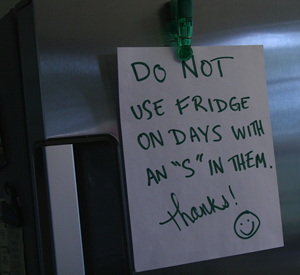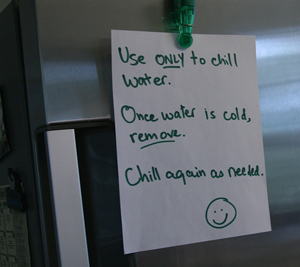A sociologist at Gulf Isthmus University has used a study of workplace kitchenettes to fundamentally upend the theory of authority. The study by Fiona Hayes-Verhorsihs has been hailed as bringing “illumination” to how power is exerted in organizations and why people obey those they perceive to have authority.
Over six years, Hayes-Verhorsihs placed signs in various kitchenettes around the Gulf Isthmus campus and nearby businesses asking people to comply with rules and then monitored whether people actually obeyed. Hayes-Verhorsihs says the experiment was essentially a continuation of work done by Stanley Milgram, who famously showed that people will follow orders from those in authority, even when it involves injuring other people. Milgram’s work has been thought to give insight into phenomena ranging from fascism and Nazism to corporate culture. Hayes-Verhorsihs’ work looks in much greater detail at why people follow orders.
 The signs Hayes-Verhorsihs placed in kitchenettes fell broadly into two categories, “sensible” and “absurd.” Her counterintuitive finding was that people were vastly more likely to follow absurd orders than sensible ones. For example, the sign, “Please wipe the sink out after you clean your dishes. Thank you!” caused compliance rates to fall between 12% and 21% at various locations. However, “Please use only pinky finger of left hand to clean out sink. Thank you!” had the opposite effect, with a majority of people complying across several instances.
The signs Hayes-Verhorsihs placed in kitchenettes fell broadly into two categories, “sensible” and “absurd.” Her counterintuitive finding was that people were vastly more likely to follow absurd orders than sensible ones. For example, the sign, “Please wipe the sink out after you clean your dishes. Thank you!” caused compliance rates to fall between 12% and 21% at various locations. However, “Please use only pinky finger of left hand to clean out sink. Thank you!” had the opposite effect, with a majority of people complying across several instances.
Hayes-Verhorsihs explains why this happens. “When an order seems like a good idea or meant to be good for you, it causes resistance. People essentially feel that anyone trying to ‘do good’ must not have real power, and they want to test that authority. An absurd order, on the other hand, causes people to assume that the authority must have true power, and people obey without thinking.”
Consistent with this theory, the more absurd the order, the more likely people are to obey it. For instance, when a sign went up requiring employees to sing the line “Cold hard bitch!” from the Jet song of the same name every time they opened the refrigerator, compliance ran at 100%. After a sign in the break room of each business directed workers to “Pound top of microwave three times with attached Maglite before using,” the microwaves took such a beating—at a compliance rate of 180% (measured after employees started hitting the microwave more than the required three times, or when not cooking at all)—that the ovens had to start being replaced in two-week cycles. “At that level of absurdity, compliance seems to shoot through the roof,” Hayes-Verhorsihs says.
The reverse is true, too. A trial using the phrase, “Please place trash in trash bin,” had to be discontinued due to the unsanitary conditions that developed.
Throughout the course of the experiment, Hayes-Verhorsihs varied the fonts used on the signs, the color of the paper stock, the tone of the language, and the only factor that influenced behavior was the relative absurdity of the order.
 James Schwantzkopf, a professor of industrial psychology, says that Hayes-Verhorsihs’ work is causing sociologists to reexamine what they thought they knew about authority. “Take the Milgram experiment. Perhaps those subjects chose to shock each other not because some authority demanded it, but because the idea of shocking another person just because they answered a question wrong is so patently absurd. It’s the absurdity that makes it impossible for us to resist.”
James Schwantzkopf, a professor of industrial psychology, says that Hayes-Verhorsihs’ work is causing sociologists to reexamine what they thought they knew about authority. “Take the Milgram experiment. Perhaps those subjects chose to shock each other not because some authority demanded it, but because the idea of shocking another person just because they answered a question wrong is so patently absurd. It’s the absurdity that makes it impossible for us to resist.”
Hayes-Verhorsihs herself points to what she says is the most disturbing implication of her work. “It suggests that the statement ‘authority is absurd’ is true. But the reason it’s absurd is not because of the leaders, the people in authority, but because of you and me, the people who respond so strongly to absurdity. We ourselves could be said to be the authors of things like the friendship between Kim Jong Un and Dennis Rodman.”
For a look at other articles about the workplace:
A Memo from the HR Manager
Medical Doctor Develops Surgery to Create the Perfect Checkout Cashier


